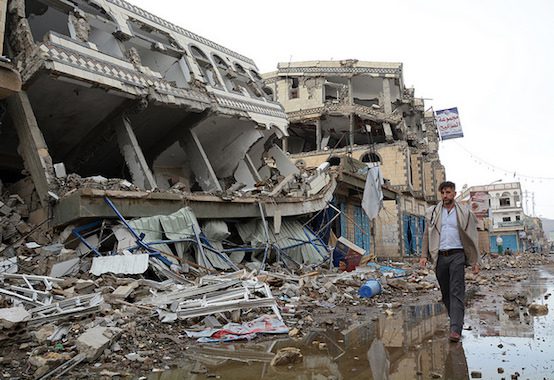The U.S. Is Still Enabling Saudi War Crimes in Yemen

UNICEF reports on recent military threats to water supplies in Yemen and the lack of access to clean drinking water for millions and millions of Yemenis. Here it describes the results of an attack on a water system by the Saudi-led coalition:
“Yemen continues to be one of the world’s most water-scarce countries. Access to drinking water is extremely costly for the most vulnerable people: 8.6 million children in Yemen don’t have sufficient access to water, sanitation and hygiene services [bold mine-DL].
“Since 2015, the escalation of conflict has only exacerbated this already dire situation, with attacks and military action on and around water infrastructure cutting off even more people from access to safe drinking water.
“Earlier this week, the Al-Hamazat water system in the Sehar district in Sa’ada governorate was completely destroyed in an attack that left 7,500 people, including internally displaced families, without water [bold mine-DL]. During the attack, the nearby solar energy system which provides power to the water system was also severely damaged. The same water system came under attack and was destroyed in 2015. UNICEF rebuilt it in 2017.
The destruction of infrastructure needed to provide clean drinking water for civilians is clearly a violation of international law, and the fact that the same system has been targeted more than once should put to rest the idea that the coalition strikes these targets only by accident. Just as it has systematically and deliberately attacked food production and distribution inside Yemen, the Saudi-led coalition repeatedly strikes at the infrastructure that the population needs for water and sewage treatment. This destroyed water system relied on solar power to operate, but many Yemenis rely on fuel to power generators to pump clean water, and thanks to the blockade there has been a fuel shortage that severely limits access to potable water. Yemen still suffers from the world’s worst cholera outbreak, and attacks like this one on sources of clean drinking water put more lives at risk from preventable diseases.
The coalition uses the weapons and refueling that the U.S. provides to deprive displaced people of clean drinking water. As we saw in the attack in Hodeidah earlier this month, on other occasions they simply kill the displaced civilians for daring to step outside to get relief from the heat. There should be no question that U.S. support enables the Saudi-led coalition to carry out these attacks, and because roughly a third of the coalition’s attacks are on civilian targets U.S. arms and refueling predictably lead to more civilian deaths.
The location of this destroyed water system is also significant. The Saudi-led coalition illegally declared all of Saada to be a military target three years ago, and it has struck civilian targets in that part of Yemen more often than in any other. There was a Senate Foreign Relations Committee hearing on Yemen earlier today, but the routine coalition targeting of civilian structures in Saada never came up, nor did the coalition’s illegal decision to treat the entire area as a military target. The routine attacks on civilians in Saada prove that the coalition forces have a blatant disregard for the lives of noncombatants, and the longer that the U.S. enables the coalition bombing campaign the more innocent Yemenis will needlessly die.
The Senate was wrong to kill S.J.Res. 54, and it is critical that they correct that terrible error and vote to end U.S. support for the war on Yemen.
Comments